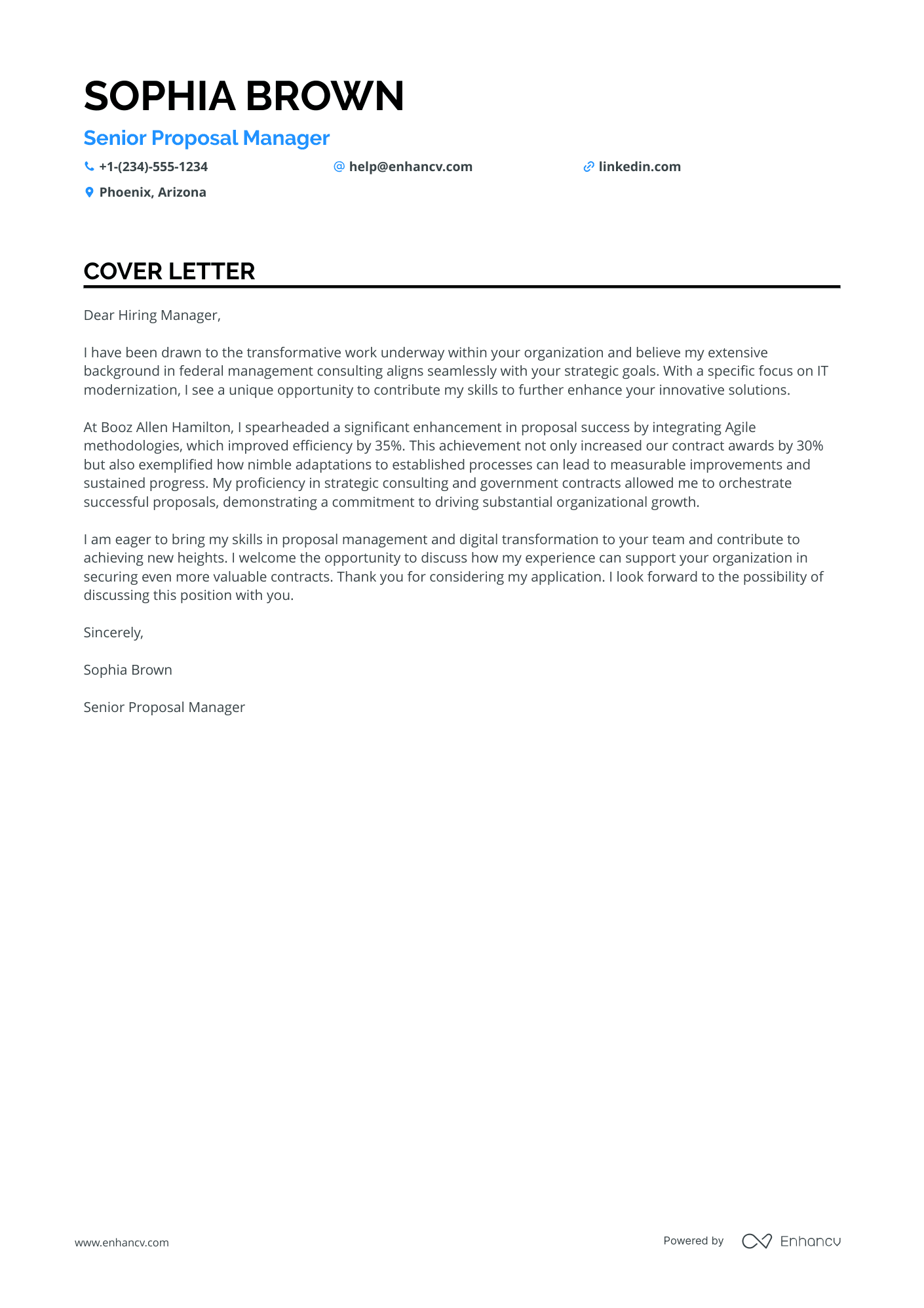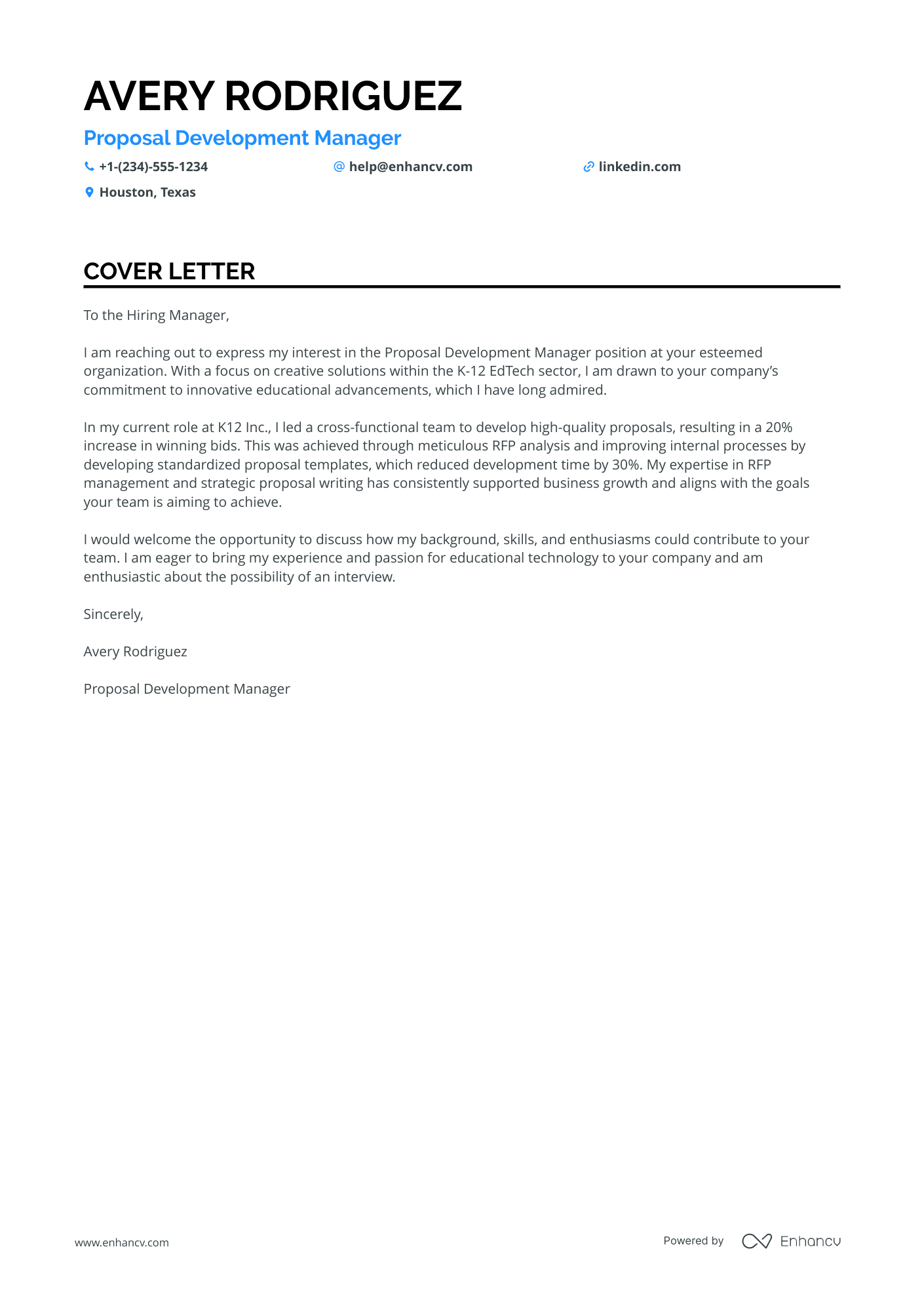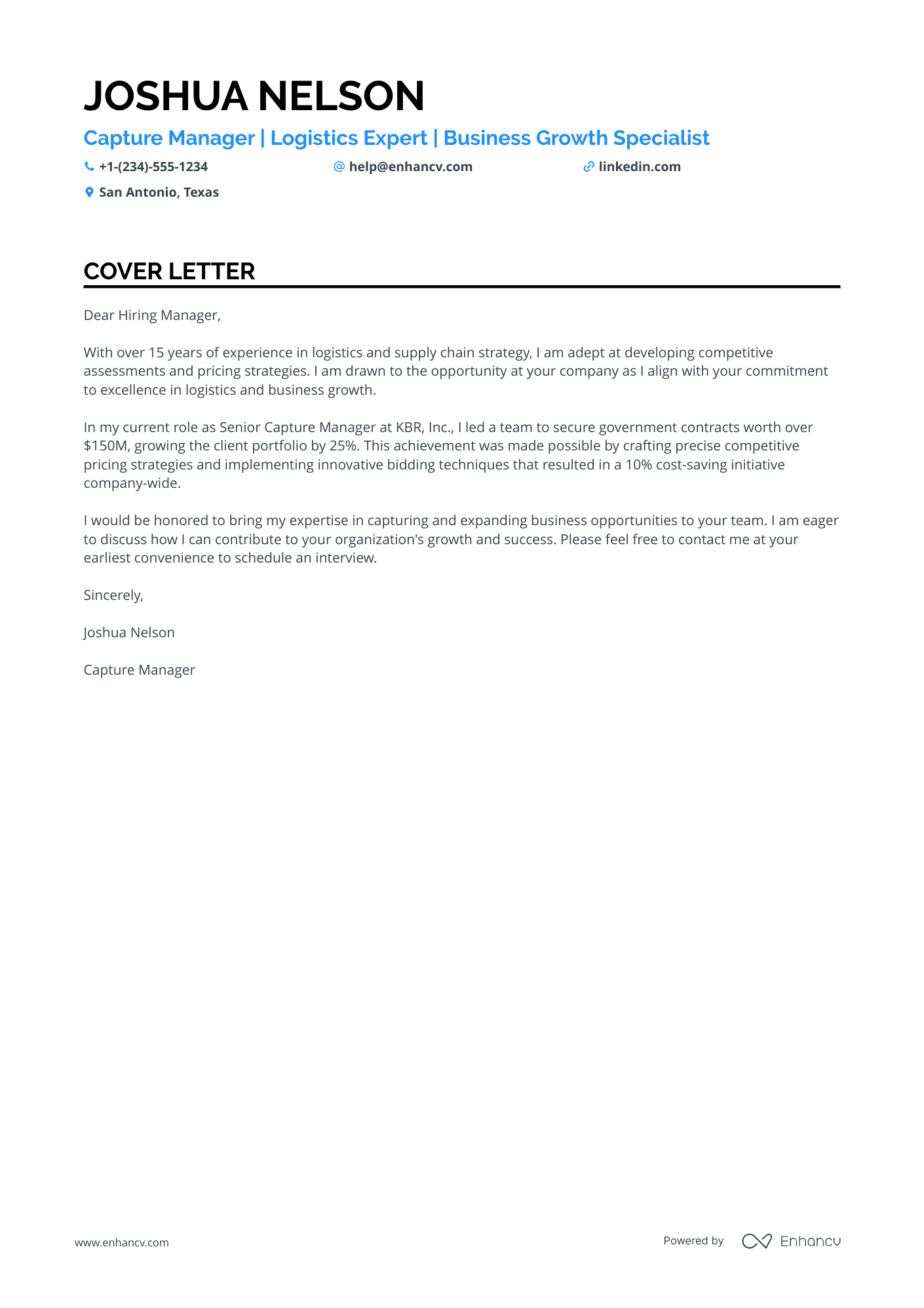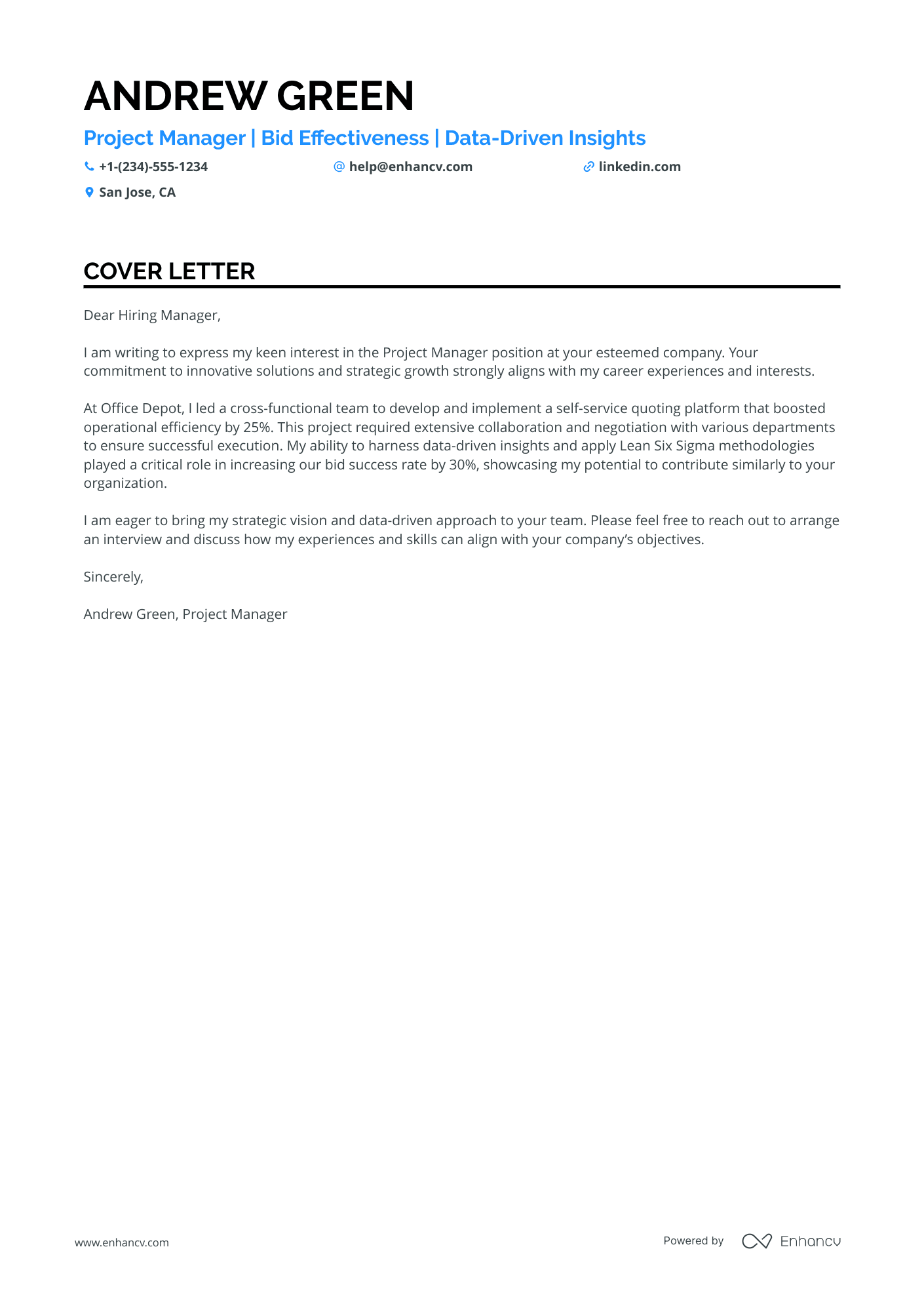Crafting a compelling bid manager cover letter can be a daunting step in the job application process. You may realize its necessity too late, after resumes have been sent. A cover letter is your chance to highlight a milestone accomplishment, bringing to life the journey behind your proudest professional moment. Striking the balance between formality and originality, without sliding into clichés, is key. Remember, brevity is your ally—keep it to one impactful page that tells your unique story.
- Including all the must-have paragraphs in your structure for an excellent first impression;
- Learning how to write individual sections from industry-leading cover letter examples;
- Selecting the best accomplishment to tell an interesting and authority-building professional story;
- Introducing your profile with personality, while meeting industry standards.
And, if you want to save some time, drag and drop your bid manager resume into Enhancv's AI, which will assess your profile and write your job-winning cover letter for you.
If the bid manager isn't exactly the one you're looking for we have a plethora of cover letter examples for jobs like this one:
- Bid Manager resume guide and example
- Deloitte cover letter example
- Investment Banking Associate cover letter example
- Accounts Receivable cover letter example
- Accounts Clerk cover letter example
- Financial Risk Analyst cover letter example
- Big 4 Accounting cover letter example
- Staff Accountant cover letter example
- Budget Analyst cover letter example
- Purchase Manager cover letter example
- Compensation Manager cover letter example
Drop your resume here or choose a file.
PDF & DOCX only. Max 2MB file size.
Bid manager cover letter example
Liam Johnson
Philadelphia, Pennsylvania
+1-(234)-555-1234
help@enhancv.com
- Highlighting career achievements with quantifiable outcomes (e.g., "directly resulting in a 15% uplift in contract wins") effectively demonstrates the candidate's impact and ability to contribute tangible success.
- Emphasizing relevant experience (e.g., "leading cross-functional teams" and "spearheading comprehensive proposal strategies") showcases that the candidate possesses both the leadership and technical skills necessary for the role.
- Illustrating the application of specialized tools or processes (e.g., "introduction of a robust Requirement Compliance Matrix") provides insight into the candidate's ability to innovate and streamline operations within the technical sales engineering field.
- Expressing alignment with the company's mission and a forward-looking approach (e.g., "furthering your mission through innovative solutions and strategic customer engagements") indicates the candidate's intention to contribute to future successes and their understanding of the company's objectives.
Structuring and formatting your bid manager cover letter
Here's what the structure of your bid manager cover letter should include:
- Header (with your name, the position you're applying for, and the date);
- Salutation (or greeting);
- Introductory paragraph (or your opening statement);
- Body paragraph (or further proof of your experience);
- Closing paragraph (with a call to action);
- Signature (that is optional).
Use the same font for your bid manager resume and cover letter - modern fonts like Lato and Rubik would help you stand out.
Your bid manager cover letter should be single-spaced and have a one-inch margins - this format is automatically set up in our cover letter templates and our cover letter builder.
When submitting your cover letter, always ensure it's in PDF, as this format keeps the information intact (and the quality of your document stays the same).
On one final note - the Applicant Tracker System (ATS or the software that is sometimes used to initially assess your application) won't read your bid manager cover letter.
Writing cover letters just got easier. Use our free cover letter generator to create yours instantly.
The top sections on a bid manager cover letter
Header: This section includes your contact information, the date, and the employer's details, showcasing professionalism and making it easy for the recruiter to reach out to you.
Introduction: Begin with a compelling introduction that briefly states your interest in the bid manager position and your relevant experience, grabbing the recruiter's attention right from the start.
Body (Bid Management Expertise): Detail your specific experience in bid management, such as understanding client needs, managing tender processes, and crafting winning proposals, to demonstrate your capability in leading successful bid initiatives.
Body (Leadership and Communication Skills): Highlight your leadership abilities and communication skills, explaining how they have been essential in coordinating teams and liaising with stakeholders, which are critical components of the bid manager role.
Closing: End your cover letter with a strong closing statement that reiterates your enthusiasm for the position, your confidence in your qualifications, and a call to action, such as requesting an interview to discuss how you can contribute to the organization's success.
Key qualities recruiters search for in a candidate’s cover letter
- Proven experience in managing and coordinating complex bids: Recruiters look for candidates who have a track record of successfully managing the entire bid process, from identifying opportunities to submitting winning proposals.
- Strong project management skills: Bid managers must plan and execute bid strategies, coordinate cross-functional teams, and meet tight deadlines, so recruiters value candidates who can demonstrate robust project management capabilities.
- Excellent communication and negotiation abilities: Recruiters prioritize candidates who can effectively communicate with stakeholders at all levels and negotiate terms with clients and suppliers to secure the best outcomes for their organization.
- Detailed knowledge of the industry and market: A bid manager should have a deep understanding of the industry they're operating in, as this knowledge is critical for crafting competitive bids and assessing risk.
- Financial acumen: The ability to create and manage budgets, understand pricing strategies, and analyze cost implications is crucial for a bid manager, so recruiters look for evidence of strong financial skills.
- Relationship-building skills: Recruiters seek candidates who are adept at fostering positive relationships with clients, partners, and team members as these relationships are often integral to securing and executing successful bids.
How to greet recruiters in your bid manager cover letter salutation
As the saying goes, "You never get a second chance to make a first impression."
Write your bid manager cover letter salutation to be more personalized to the actual hiring manager, who is set to assess your profile by:
- greeting them on a first-name basis, if you have previously communicated with them (e.g. "Dear Sam,");
- using their last name, if you have more formal communication or haven't spoken to them (e.g. "Dear Mr. Harrows" or "Dear Ms. Marshall");
- writing "Dear HR Team" or "Dear Hiring Manager", if you have no clue about who's recruiting for the role.
Search on LinkedIn, Google, or the company website to find information as to the recruiter's name.
In any case, avoid the impersonal "Dear Sir or Madam".
List of salutations you can use
- Dear Hiring Manager,
- Dear [Company Name] Team,
- Dear [Department Name] Hiring Committee,
- Dear Mr./Ms./Dr. [Last Name],
- Dear [Job Title] Search Committee,
- Dear [First Name] [Last Name],
How to start your bid manager cover letter introduction
The opening paragraph of your bid manager cover letter can seem like a real enigma.
Where do you start writing?
In your bid manager cover letter introduction, focus on yourself by stating what:
- gets you motivated and excited about the role;
- you like best about the company, from culture to awards.
Write no more than two sentences, which are both authentic and show your enthusiasm for the opportunity.
The middle or body of your bid manager cover letter body: a great instrument to tell a story
Now that you've set the right tone with the greeting and introduction of your bid manager cover letter, it's time to get down to business.
Hear us out, the body of your bid manager cover letter is the best storytelling instrument you have, in your job-hunting arsenal.
Writing the next three to six paragraphs, take the time to reassess the advert to discover job-crucial requirements.
Next, choose one accomplishment that covers those key skills and talents.
Use precisely that achievement to tell an exciting story of how you match the ideal candidate profile.
In the undertones of your story or bid manager cover letter body, hint at the difference you'd make and sell your application as the perfect one for the job.
Final words: writing your bid manager cover letter closing paragraph
The final paragraph of your bid manager cover letter allows you that one final chance to make a great first impression.
Instead of going straight to the "sincerely yours" ending, you can back up your skills with a promise of:
- how you see yourself growing into the role;
- the unique skills you'd bring to the organization.
Whatever you choose, always be specific (and remember to uphold your promise, once you land the role).
If this option doesn't seem that appealing to you, close off your bid manager cover letter with a follow-up request.
You could even provide your availability for interviews so that the recruiters would be able to easily arrange your first meeting.
What could you write about in your bid manager cover letter when you have no experience
Candidates with zero professional experience often struggle to write their bid manager cover letter.
You may lack experience, but your application could still be impressive when you focus on your strengths.
Consider your most relevant talents (and/or one achievement) that align with the role and help you stand out.
Perhaps you spent every summer volunteering at your local dog pound - think of the job-relevant skills this experience taught you.
Sharing your tangible career goals is another good strategy to stand out.
Key takeaways
Within this Enhancv guide, we've provided you with plenty of advice and inspiration on writing your bid manager cover letter:
- Always make sure your bid manager cover letter is tailored to the role you're applying for to make a good impression on recruiters;
- In your bid manager cover letter include a header (with your name, the role you're applying for, date, and contact details) and an introduction of up to two sentences that highlight your key accomplishment or why you'd fit the role;
- Focus your bid manager cover letter body on one sole achievement through your career and all the valuable lessons, skills, and know-how you've learned (that are relevant to the role);
- Ensure your bid manager cover letter closing statement isn't generic and includes either a call to action or a promise;
- If you lack professional experience, shift recruiters' focus to a relevant achievement (thanks to your academic or versatile experience) or toward your dreams and goals for professional growth.
Bid Manager cover letter examples
By Experience
Senior Bid Manager
- Explicitly highlights relevant experience and skills, such as a background in federal management consulting and IT modernization, which are pertinent to the organization and role.
- Uses specific metrics and outcomes, such as improving efficiency by 35% and increasing contract awards by 30%, to demonstrate the effectiveness and impact of the candidate’s contributions.
- Emphasizes strategic and technological competencies, such as integrating Agile methodologies and proposal management, to align with the company's focus on innovation and modernization.
- Conveys enthusiasm for the organization's mission and expresses a clear intention to contribute to further growth and success, which shows alignment with the company's goals.
Junior Bid Manager
- Highlight relevant industry experience: The candidate effectively mentions their experience with a similar role at K12 Inc., demonstrating understanding and expertise in the K-12 EdTech sector.
- Quantify achievements: The letter includes specific metrics, such as a 20% increase in winning bids and a 30% reduction in proposal development time, to offer tangible evidence of success and impact.
- Align with company goals: The candidate shows enthusiasm for the company's mission and expresses how their skills align with the organization's aspirations, demonstrating both interest and an understanding of the business.
- Emphasize leadership and process improvement skills: Highlighting the ability to lead a cross-functional team and improve internal processes showcases valuable skills that would benefit a proposal development role.
By Role
International Bid Manager
- Emphasize extensive experience in logistics and supply chain strategy, showcasing a deep understanding of the industry and ability to contribute significantly to the role.
- Highlight specific achievements, such as securing high-value contracts and significantly growing the client portfolio, to demonstrate proven success and results-oriented mindset.
- Detail innovative approaches, such as implementing cost-saving initiatives, that showcase problem-solving skills and ability to drive efficiency.
- Convey enthusiasm and alignment with the company's values to establish a personal connection and show sincere interest in the role.
IT Bid Manager
- Alignment with Company Values: The cover letter highlights alignment with the company’s commitment to innovative solutions and strategic growth, which shows the candidate's understanding and interest in the organization’s goals.
- Project Management Experience: Specific examples of leading cross-functional teams and achieving measurable results (e.g., boosting operational efficiency by 25%) demonstrate the candidate's capability in managing and executing successful projects.
- Quantifiable Achievements: Mentioning a 30% increase in bid success rate provides concrete evidence of the candidate’s impact and effectiveness in previous roles.
- Relevant Methodologies: The use of Lean Six Sigma methodologies showcases the candidate’s proficiency in process improvement techniques that are highly relevant in project management roles.













